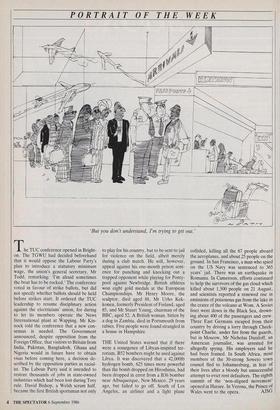PORTRAIT OF THE WEEK Tut you don't understand, I'm trying
to get out.'
The TUC conference opened in Bright- on. The TGWU had decided beforehand that it would oppose the Labour Party's plan to introduce a statutory minimum wage, the union's general secretary, Mr Todd, remarking: 'I'm afraid sometimes the boat has to be rocked.' The conference voted in favour of strike ballots, but did not specify whether ballots should be held before strikes start. It ordered the TUC leadership to resume disciplinary action against the electricians' union, for daring to let its members operate the News International plant at Wapping. Mr Kin- nock told the conference that a new con- sensus is needed. The Government announced, despite opposition from the Foreign Office, that visitors to Britain from India, Pakistan, Bangladesh, Ghana and Nigeria would in future have to obtain visas before coming here, a decision de- scribed by the opposition parties as racial- ist. The Labour Party said it intended to restore thousands of jobs in state-owned industries which had been lost during Tory rule. David Bishop, a Welsh scrum half, became the first British sportsman not only to play for his country, but to be sent to jail for violence on the field, albeit merely during a club match. He will, however, appeal against his one-month prison sent- ence for punching and knocking out a trapped opponent while playing for Ponty- pool against Newbridge. British athletes won eight gold medals at the European Championships. Mr Henry Moore, the sculptor, died aged 88, Mr Urho Kek- konen, formerly President of Finland, aged 85, and Mr Stuart Young, chairman of the BBC, aged 52. A British woman, bitten by a dog in Zambia, died in Portsmouth from rabies. Five people were found strangled in a house in Hampshire.
THE United States warned that if there were a resurgence of Libyan-inspired ter- rorism, B52 bombers might be used against Libya. It was discovered that a 42,0001b hydrogen bomb, 625 times more powerful than the bomb dropped on Hiroshima, had been dropped in error from a B36 bomber near Albuquerque, New Mexico, 29 years ago, but failed to go off. South of Los Angeles, an airliner and a light plane collided, killing all the 67 people aboard the aeroplanes, and about 25 people on the ground. In San Francisco, a man who spied on the US Navy was sentenced to 365 years' jail. There was an earthquake in Romania. In Cameroon, efforts continued to help the survivors of the gas cloud which killed about 1,500 people on 21 August, and scientists reported a renewed rise in emissions of poisonous gas from the lake in the crater of the volcano at Wom. A Soviet liner went down in the Black Sea, drown- ing about 400 of the passengers and crew. Three East Germans escaped from their country by driving a lorry through Check- point Charlie, under fire from the guards, but in Moscow, Mr Nicholas Daniloff, an American journalist, was arrested for allegedly spying. His employers said he had been framed. In South Africa, most members of the 30-strong Soweto town council fled to Johannesburg, in fear of their lives after a bloody but unsuccessful attempt to evict rent defaulters. The eighth summit of the 'non-aligned movement' opened in Harare. In Verona, the Prince of Wales went to the opera. AJSG






































 Previous page
Previous page